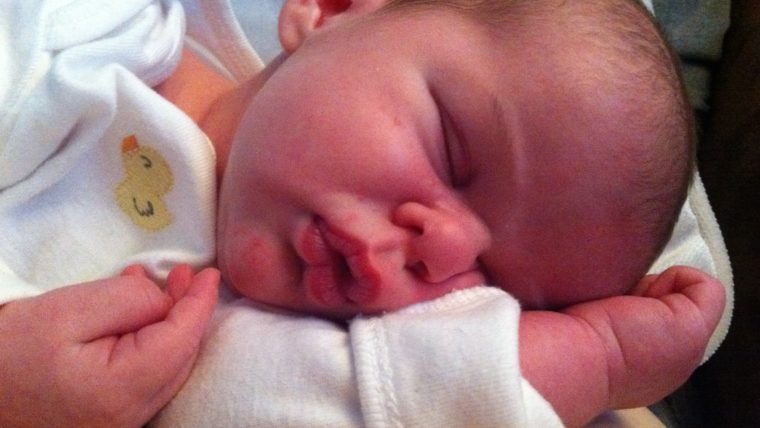
– by Tiffany Gough
On all the different peaceful/gentle/respectful parenting pages I follow on Facebook, the most common question I see is almost always a variation of this: “HELP! My baby won’t sleep (anymore). We’re not functioning well as a family because we’re all sleep deprived. I need help, but I don’t want to do CIO. Any advice?” The most common response to this type of post is, “Hang in there, mama! They’re only little for a short time!” Does this question sound familiar? What about the response?
“CIO” refers to “Cry-It-Out” which is the term typically used to describe the controlled crying and extinction methods of sleep training. It is a popular term that does not have a consistent definition and carries a negative connotation. It is often incorrectly assumed to be synonymous with all sleep training.
My issue with the advice given to these parents is that the “Hang in there” response suggests that the real issue is somehow the parent’s lack of patience or love, not sleep dysregulation. The issue of infant sleep learning is not black and white. There are so many options between cry-it-out and doing nothing and no parent should be expected to sacrifice herself to prevent her child from ever experiencing discomfort or frustration. First, because it’s unreasonable, and second, because your children will experience frustration no matter how hard you try to keep it from them, but you all will handle it better if you are well rested. Read Part III of this series for more information on how to do respectful sleep learning.
More and more, parents are focused on raising their children in accordance with attachment theory, which says that children who develop secure emotional attachments in the first one to two years of life will grow into adults who are able to form secure and stable emotional relationships. (This is not to be confused with Dr. Sears’ Attachment Parenting.) Based on a wealth of misleading information, these parents believe that sleep training would mean losing their child’s trust or causing brain damage. They instead choose a method they call “wait-it-out,” sacrificing their own sleep and well-being every day until (they hope) their child eventually takes a more independent role in sleeping. This method stems from the desire to maintain a secure  attachment with their baby and a simple misunderstanding of the science of sleep. These parents recoil at the slightest mention of sleep training.
attachment with their baby and a simple misunderstanding of the science of sleep. These parents recoil at the slightest mention of sleep training.
When it comes to babies and sleep, most people think the only options are to hold, rock, nurse, bounce, etc. (“wait-it-out”), or leave the baby to “cry-it-out”. Most of these gentle parents do the wait-it-out method because they have written off all sleep training as being detrimental to development of self-regulation, neural connections, caregiver sensitivity and responsiveness, brain development, and even physical health. The real harm of the use of the term, “CIO”, is that it drives parents to the opposite extreme and does not encourage research or objectivity. When it comes to sleep learning, people feel very strongly and tend to speak in extremes to make their point. The unfortunate result of this is a severe misunderstanding of what sleep training really is.
Parents often cite articles such as these when they talk about the dangers of “CIO” and say emphatically that they will never sleep train or let their babies cry:
http://www.evolutionaryparenting.com
http://www.psychologytoday.com
http://www.askdrsears.com
http://www.cnn.com
These articles falsely use “CIO” interchangeably with sleep training. They also exaggerate and misapply evidence to “prove” the damaging and harmful effects of leaving a young infant to “cry-it-out.” The fact is, the methods and practices referenced are not actually recommended by most sleep experts, nor are they typically suggested for babies under six months old, as these authors claim to imply relevance. While my son was an infant, I read articles from various experts talking about the stress relieving quality of a good cry and I used what I learned to provide him a safe space to express his feelings, but I didn’t know how to apply what I was learning practically in regard to sleep, because I was so certain the science showed that my baby would be damaged by crying alone and he refused to sleep with me in the room if he wasn’t nursing.
Among the many freely available resources on sleep training (online and print) that allow for crying, most recommend a handful of intermediate approaches before suggesting crying (alone or supported) be used as a tool. I personally ‘broke down’ and read the toddler chapter of Dr. Weissbluth’s Healthy Sleep Habits, Happy Child, which I had always feared as one of those books (mostly due to a pervasive misunderstanding of the suggested techniques). On reading it, there was actually very little I did not agree with or at least understand. Read one mom’s review of the book here.
So why do so many other parents choose to sleep train? “Studies have shown that poor sleep quality and/or quantity in children are associated with a host of problems, including academic, behavioral, developmental and social difficulties, weight abnormalities, and other health problems. Not only do pediatric sleep problems affect child health, but they can impact family dynamics and parental or sibling sleep” (stanfordhospital.org). Healthy sleep should be a priority! It is the building block for all of our children’s growth and development, as well as for our own ability to function. So why do we sacrifice it out of fear? If sleep is so important, why leave it to chance?
Read my experience and the result these misunderstandings had on my approach to my son’s sleep up next in Respectful Sleep Learning Part II and how to counter the fear with useful, practical sleep tools in Respectful Sleep Learning Part III.
Disclosure of Material Connection: Some of the links in the post above are “affiliate links.” This means if you click on the link and purchase the item, I will receive an affiliate commission. I only recommend products or services I use personally and believe will add value to my readers.

Wow, this describes my own journey with my children and sleep to a “T”. Thank you so much for writing this! I hope more of us speaking out will turn the tide of sleep deprivation and guilt and help other new mamas connect with their children *and* be well-rested.
Thanks, Suchada! I have been such a fan of your blog and it really helped me to finally understand the whole “sleep thing”. I appreciate your stamp of approval! 🙂